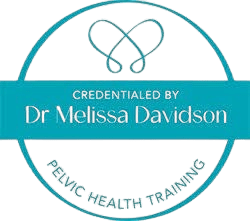Menopause Pelvic Health
Say goodbye to the anxiety related to:
- Sexual discomfort
- Urinary Incontinence
- Prolapse
- Inability to exercise because of these symptoms
If you’ve been suffering, the good news is I can help!
Menopause Warrant of Fitness
As we reach perimenopause most of us have experienced some of these risk factors that can lead to pelvic floor issues like:
- Childbirth
- Gynae Surgery
- Respiratory illnesses
- Constipation
- Weight gain
A menopause warrant of fitness check will assess your pelvic floor function now in light of these risk factors and your current hormonal changes/symptoms. You will go away with personalised pelvic floor exercise prescription, pelvic health lifestyle advice and a follow up appointment to assess your progress. You’ll notice changes within 4 weeks but it may take 3-6 months to regain full strength depending on what you wish to achieve.

Eliminate/Reduce Pelvic Health Issues In 3 Steps
Assessment
This involves taking a thorough history. Then an external and internal examination will assess your pelvic floor function or any vulvovaginal symptoms you may be having.
Health Advice
After your assessment it will be clear in most cases what the problem is. A plan of treatment will be provided and personalised to your needs.
Treatment Plan
You can expect to receive exercises and or lifestyle advice. You may feel improvements with 4 weeks but exercises need to be progressed. Follow up appointments are recommended to reach your goals.
Sometimes you may need to see your GP especially if medications are required. Please also see individual sections related to specific conditions.
Sexual Function
Sexuality is an important part of our wellbeing. Issues in this area become easy to discuss when you speak privately to an experienced Registered Nurse in a consultation that is unhurried and where you feel comfortable to open up about changes you may be experiencing.
Problems
Typical sexual problems in menopause:
- It is sore during sex. It hurts and I can’t wait for it to be over. Sometimes the pain is at the entrance or higher up near my cervix.
- I have no libido, I don’t really care if I ever have sex. I don’t feel turned on anymore, I don’t masturbate or orgasm as much as I’d like to. This is affecting my relationship.
Benefits
- Internal assessment allows us to see where the problem is. Treatment differs based on where the problem is.
- As a healthcare professional I realise that some women may feel uncomfortable about a vaginal examination. I explain carefully what happens and obtain patient consent before proceeding. Most women feel very comfortable and find they understand their body a lot more from having the exam.
Solutions
- I provide relaxation exercises for women who have difficulty letting go of the pelvic floor muscles to encourage them to relax.
- For pain or discomfort at the entrance it can be as simple as using a lubricant or moisturiser to fix the problem.
- If the pain is higher up near the cervix, I provide pelvic floor exercises if the uterus is lower down or prolapsed.
- Doing your pelvic floor exercises can help increase sensation for orgasm and internally as well. We talk through the other causes of low libido, like hormones and body image and healthy relationships.
Urinary Incontinence
There are different types of urinary incontinence. Some of the more common ones are stress urinary incontinence when you may wee when you cough, jump, sneeze or laugh. There is urgency incontinence which becomes more common in menopause. Women here worry that they may not make it to the loo in time.
Nocturia is a condition where women experience frequency of urine at night. This can keep them awake. All of these conditions can occur at once which is known as mixed incontinence.
Problems
- Sometimes I feel such a strong urge to pee. It makes me feel anxious because I worry that I can’t get to the loo in time.
- When I sneeze the wee just comes out. Sometimes I need to wear a pad, especially during exercise.
- I have frequent urination, I seem to be peeing more than usual and I’m up in the night, sometimes more than once.
- I’ve heard that urinary incontinence can get worse with age. I’ve noticed a few changes, I really don’t want to be that smelly old lady in a rest home when I get older.
Benefits
- Increase your confidence to know that you are doing your pelvic floor exercises right.
- Nip those leaks in the bud by strengthening your pelvic floor with a personalised exercise prescription by assessing the pelvic floor muscles and organs with a quick vaginal examination.
- The process is easy and interesting as you are involved in it by contracting your muscles. This provides you with instant feedback.
Solutions
- You will receive your own pelvic floor exercise plan.
- You will notice differences in your pelvic floor strength within a month. I provide you with follow up exercises to do.
- I will show you how to decrease frequency, urgency and leaks during sneezing and at the gym.
Prolapse
Prolapse means “falling out of place.” One, two or three of the pelvic organs can fall out of place usually because excess pressure has been placed on them during episodes of coughing, childbirth, lifting heavy weights, menopause hormone changes or constipation.
Problems
- I feel a heaviness or dragging sensation between my legs. This happens after exercise, or lifting heavy objects or at the end of the day.
- My Mum had prolapse. I am wondering if I could have this too. I have seen her struggle although she doesn’t say much. Can I see you to see if I have prolapse too?
- I’ve had 3 vaginal births, I’ve heard this is a risk factor for prolapse. Now that I am in Menopause I feel like I should get things checked. I’ve never seen a pelvic health professional before.
Benefits
- When you have a vaginal examination I can palpate the vaginal walls to feel if your bladder or bowel is pressing against the vaginal walls. A simple test such as cough can detect if the pelvic organ moves more with increases in pressure.
Solutions
- Pelvic floor exercises can help with prolapse. As we strengthen the pelvic floor muscle this provides more support to the pelvic organs and can elevate them back into position so you don’t feel the heaviness or dragging sensations.
- I will also show you ways you can exercise and lift objects safely to reduce pressure on your pelvic organs by using your pelvic floor muscle and your breath.
Pelvic Floor Friendly Exercise
It is important to keep exercising and moving in a way that uses your core muscles to support you. By working with a Registered Exercise Professional with 10 year’s experience in exercising women with pelvic floor issue’s you’ll be in good hands.

Problems
- I can’t exercise. I am so worried that I’ll put pressure on my prolapse and that will make it worse.
- I am over the peeing during exercise. Wearing a pad and always black pants makes me feel yuk. I am worried someone will see the pad or I will smell.
- I’ve given up on exercise as I am so embarrassed about peeing and prolapse symptoms. I do not know who to talk to about this. I worry that my health will be affected from not moving.
Benefits
- It important to keep exercising and moving in a way that uses your core muscles to support you. Doing this will take pressure off your pelvic organs and prevent leaking of urine or prolapse symptoms becoming worse. You will be able to use this knowledge and apply it to everyday activities at home, like lifting heavy objects.
Solutions
- I’ll show you ways to move and exercise without leaking or making prolapse symptoms worse. It is easy when you know what to do. Then you can take control back and move with confidence again to improve your mental and physical health.
Book a free 15 minute call with Lynda to find out how she can help.
If you’re experiencing any perimenopausal symptoms that are bothering you, book a call with Lynda to get clarity and a plan of action.
